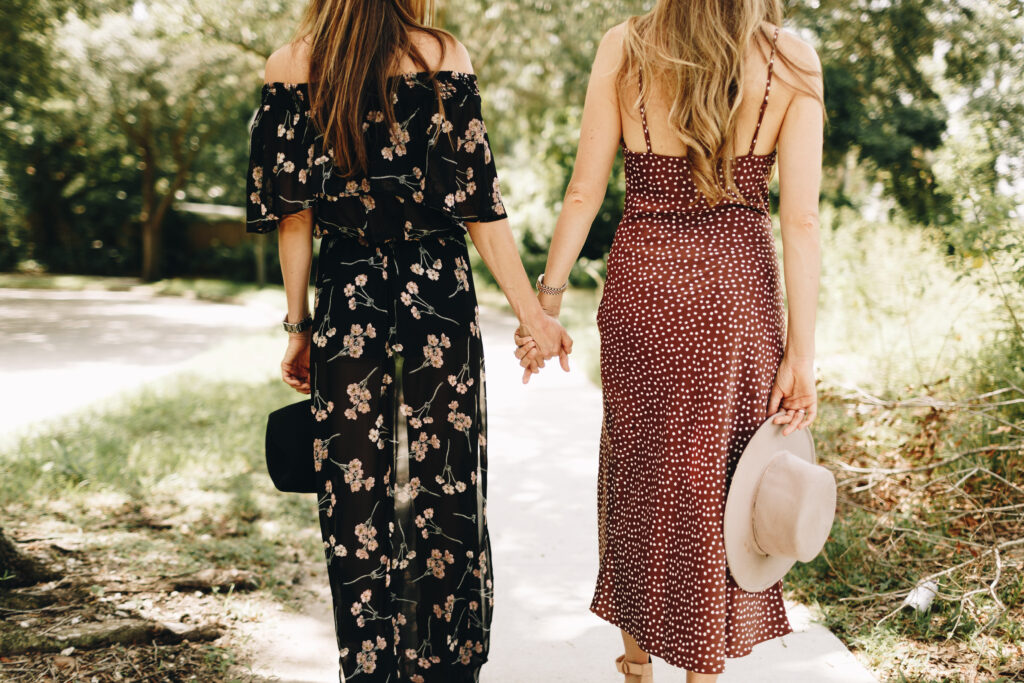Why Are Female Friendships So Hard? A Guide to Making (and Keeping) Friends in Your 30s, 40s and 50s
April 23, 2024

A whole lot more than our skin texture, boob perkiness and ability to roll quickly out of bed in the morning changes when we hit our 30s, 40s and beyond. Something else that changes are our friendships. Ever notice that it can seem like female friendships are hard to establish or maintain the older we get?
My own non-expert explanation of this is twofold: One, we have less time, so we automatically reach out less or make fewer girls’ nights as a result of that. And two, we become–justifiably–more rigid in our beliefs and habits as we age, and some friendships just don’t withstand the test as a result.
Don’t get me wrong: I’ve found the most immensely-rewarding friendships in my 30s and 40s. The connections mainly start from a common experience in motherhood–sharing funny stories, say–or begin simply from spending lots of time around other moms whose kids are in the same activities. You really have to be open to friendship at any opportunity for it to take root and grow.
But that doesn’t mean that new friendships always come easily, or that they’re easy to maintain after they start.
I reached out to a friend of the blog and podcast, therapist Niro Feliciano (you’ve probably seen her featured on the Today Show!) and author of This Book Won’t Make You Happy, to talk about this topic. A long time ago, we even did a podcast on it, and I want to do another one on this same topic soon.
But in the meantime, I wanted to put up a post with all of her sage advice so you can come back to it when you’re feeling a little down. I hope this makes you feel a little less alone!
Why do adult female friendships tend to feel more difficult to maintain than other relationships in our lives?
Niro: I’ve said this over and over again: I have the same conversation with 12-year-old girls that I do 40-year-old women. Some of the issues don’t change; they just evolve.
Insecurity, comparison, low self-worth, the need to be better than another—they can make secure friendships hard to find.
I do think that, as we get older and evolve, not everyone grows at the same rate. [We have] differences in parenting, marital relationships and how we navigate them, and priorities and values can all change later in life, which will affect connection in friendships.
I have seen women evolve and look for deeper more meaningful experiences, spirituality, and that changes what’s important to a person. [On the other hand] some continue to pursue things that are more superficial, and that creates a disconnect.
We want to be with people who we can share experiences with, and who understand us. And when we see the world vastly differently, it can change who we connect with.
How would you suggest broaching any uncomfortable topic with a friend–for example, if they hurt our feelings? As a follow-up, how do you suggest making things better if we feel something is “off” with a friend?
So many people do not address their feelings; they just put distance in the relationship and eventually end it.
Sometimes, if you have a close friend and things are good, it’s worth clarifying at the beginning: “If I ever upset you or hurt you, let’s talk about it.”
If it’s a good friend or a close friend, it’s certainly worth addressing. It’s important to think about the ways that you have connected in the past and how that friend has shown up for you. It helps to get perspective before you address the situation. Always give them the benefit of the doubt and try to come up with the most generous explanation of how and why it could’ve happened.
I would say, “Look, I wanna talk to you about something that I feel is affecting our friendship, and you’re important to me so I’d like to work this out.”
If that person is defensive and not willing to work it out or take ownership, that is information for you. Maybe that relationship becomes more superficial or you realize it’s when you don’t want to invest your time in any longer. And that is okay. It’s okay to have friends for a season.
You can always ask them as well, “Have I done anything to upset you, because I feel like something is off between us?” Taking ownership, even when you feel like you haven’t done something, can be a good lead in and help to bring down defenses to have a more vulnerable conversation.
What’s a good rule of thumb to determine if we should keep a friend in our life or move on?
It’s important to think of how this friend adds value to your life and how you add value to theirs. Is there mutuality in the friendship? Does this friend drain you? Does this friend show up for you? What’s the benefit? Do they celebrate your wins or is there jealousy?
Sometimes we are friends with people and we give more. That’s okay If that experience is still meaningful to you.
But if the friendship is truly one-sided, draining, if you don’t feel great after you spend time with this person, or don’t feel like you can be yourself or like who you are when you’re with this person, then it’s time to evaluate if it’s worth your time.
We all have such a little time these days, it’s important that we use it well with people who are life giving. Life is too short not to.
© 2022 WGT Designed by leche studio
PRIVACY & TERMS
CONNECT
NAVIGATE
Home
Blog
Work With Me
More From Us
Want to be the first to get the latest updates and news?
About
Podcast
Contact